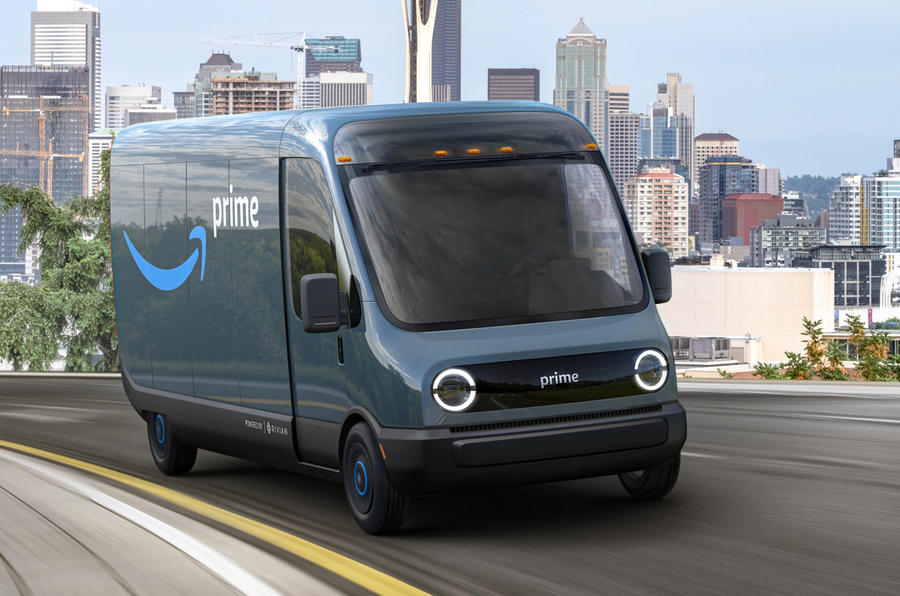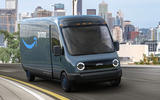Internet retailing giant Amazon has had a profound – and lasting – impact on society. It has changed shopping habits and upset entire industries, in turn having a direct impact on the health of high streets. The positives and negatives of what’s been called ‘the Amazon effect’ are the subject of hundreds of books (seriously, there are loads of them available to buy on, erm, Amazon).
Now the ‘Amazon effect’ could be about to disrupt the automotive industry, thanks to the Seattle-based firm placing an order for 100,000 electric delivery vans. While that might not sound glamorous, some of the specifics of the deal are set to have a lasting impact.
The first notable point is that the order has been placed not with an automotive giant but with Rivian, an American start-up developing its own ‘skateboard’ chassis as the basis for a range of rugged go-anywhere electric vehicles (EVs). Rivian is fast separating itself from a pack of fledging EV companies with its well-formed ideas and an ability to attract an impressive amount of investment from the likes of Ford and Amazon.
Of course, it makes sense for Amazon to place an order with a firm it has a large financial stake in, so this is really a logical extension of its earlier investment. But it’s still significant that Amazon has chosen to invest in a promising small firm rather than go for the security of a supply deal with a proven manufacturer, because it potentially gives it more control over its future supply of delivery vehicles.
Interestingly, the rendering of the delivery van released by Amazon (which has similar frontal styling to the Honda E) shows it branded with the firm’s Prime service. While specifics haven't been confirmed, it's likely the vans will be produced to Amazon’s specifications as a pure customer deal, and working with a small firm such as Rivian likely gives Amazon more control over that process. In doing so, it cements Rivian as a major player.
That also shows the possibilities created by electric ’skateboard’ chassis, which feature the batteries under the floors and motors at either end, making them far easier to place bespoke bodies on. The merits of that approach have already been shown by the likes of Volkswagen with its MEB platform, which is set to underpin everything from the ID 3 hatchback to the ID Buzz van. What the Amazon deal shows is how that could lead to a revival of coachbuild-style machines, giving firms the option to use bespoke, own-brand bodywork. In a similar fashion, Volkswagen is offering the MEB platform to other firms to use.











Join the debate
Add your comment
Have an attention to this
Have an attention to this posts, you may not have noticed me before (If you didn't) - how can you do those cruel upgrades on Warbands, I wouldn't even know what to try to pick up there, look how it looks in my cube!I haven't have an hour, no time to waste to make a long post and I'll need to make a huge video explaining it, like my last post/forum thread.
Play Ocean Magic slot machine at Planet Hollywood in Las Vegas at 4:55 p.m. on Saturday, April 18, 2016. (David Becker/Las Vegas Review-Journal) Follow SLOTMODE.GUIDE
Batteries shouldn't be used...
to propel weighty vehicles, such as vans, and most certainly not those stupid Tesla trucks. These vehicles will need to have huge battery packs on board as if they gobbled up a city car to a couple of cars whole. That much batteries they will need to carry to get a decent range.
And your EV engineering
Electrical drive trains work best when the duty cycle is high (semi trucks and delivery vehicles fit this pattern), thus the cost of the batteries is amortised more rapidly by the per journey cost reduction.
The Tesla semi has 5000 kg of batteries, but the electric motors are a fraction of the weight of an engine and gearbox and a regular diesel truck carries up to a tonne and a half of fuel. Thus the weight difference as a % of GVW is pretty small.
Delivery vehicles make very good sense to electrify, they should be cheaper as a whole life prospect. The issues are firstly building at the scale to get the costs down and also building a charging network that suits a delivery fleet.
This is only going to be achieved by a large delivery company making the first move.
To be honest....?
No, not in my part of the World, never an Amazon Van, usually DPD or unmarked Van, as long as it arrives when it says, I don’t care what Van or who delivers my Parcel....
@ Peter
"as long as it arrives when it says, I don't care what Van delivers my parcel"
An increasing number of customers DO care - maybe you should too? 50 years ago we had our milk delivered by an EV (milk float) in recyclable containers (glass bottles). We may soon be seeing this type of service again...
To be clear here...
I should have added....as long as it’s an EV powered, easy to say now I know, but I didn’t think I had to say so.....
Milk delivery is still pretty
I already have this service,
I already have this service, in fact I don't think it ever went away entirely. My milk is delivered in glass bottles and I am politely reminded by e-mail if I continue to forget to put the empties out for collection! The supplier is already investing in new electric vehicles, see: https://www.milkandmore.co.uk/electric-pioneers